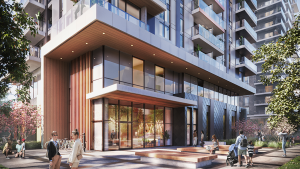The Urban Development Institute – Pacific Region (UDI) is scolding the City of Vancouver for its denial of a condo project in Chinatown.
The project, which would have been at 105 Keefer St., was a nine-storey building with 111 residential units, retail shops, a privately run cultural-amenity space on the first floor and three levels of underground parking. The amenity space for seniors would have been secured at 50 per cent of the market rate for at least 10 years, explains the institute.
"UDI is disappointed by the City of Vancouver’s surprise decision to reject a residential building project that had met the municipality’s regulations and policies," wrote Anne McMullin, UDI president in a statement following the decision. "The proposed Chinatown development was revised five times over the course of four years and received the support of expert city staff, the city’s Urban Design Panel of design professionals, met existing zoning regulations and conformed to the official community plan."
The city’s chief planner, Gil Kelley, and chief engineer, Jerry Dobrovolny, voted to reject the proposal, with assistant city manager Paul Mochrie voting against their motion.
"Because this is such an important site, with such design significance to Chinatown, and because I feel that the application has not met the design test in my view, I’m going to support the motion to refuse the application," said Kelley during the meeting.
McMullin explained it is the first time since 2006 that the Development Permit Board has rejected an application.
"We, the industry, see no policy reason for why this was rejected," continued McMullin. "Our members, and the thousands of individuals represented in all facets of development and building, are concerned this decision undermines the integrity and reliability of the city’s rigorous planning regime, and puts into question future projects, not only in Chinatown, but across the city."
She added the decision has sent a "negative chill" through the industry which is already suffering from low housing supply.
"This ruling creates significant uncertainty because our members don’t know if they can rely on zoning, urban area plans, advice of city staff or recommendations of the Urban Design Panel," she said.
The project received fierce opposition from some Chinatown residents, particularly Chinatown Action Group. According to the group’s website, they believed the project was dispresctful to the history and culture of the area and called for affordable social housing to be built rather than condos.










Recent Comments
comments for this post are closed